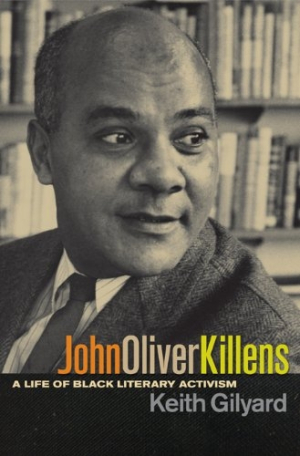John Oliver Killens
A Life of Black Literary Activism
Hailed as the dean of African American writers in the 1980s, John Oliver Killens (1916-1987) wrote fiction (novels, short stories, screenplays), nonfiction, and taught at the university level. He moved in the same circles in the 1950s and 1960s as Dr. Martin Luther King, Jr., Maya Angelou, Malcolm X, Langston Hughes, Harry Belafonte, and many others.
After writing a book about the rhetoric and poetics of Killens (Liberation Memories: the Rhetoric and Poetics of John Oliver Killens), Keith Gilyard allowed himself to be convinced to write a biography of the man as well. Gilyard wisely chooses Killens’ political activism as the center of this biography. Other than his writing, it’s the area of life for which Killens is best remembered. His political views were decidedly leftist, which got him onto the FBI watch lists early in his career and likely prevented him from getting more work in Hollywood than other screenwriters. He published only a handful of novels, but his nonfiction helped coalesce the emotional and intellectual vanguard of the civil-rights movement in the US in the 1960s. Black Man’s Burden, a nonfiction essay collection, was published in 1966 and included work by James Baldwin and Malcolm X. Killens believed that his art could help free the descendants of slaves in America; his first published novel, Youngblood, was one of his first steps toward that goal.
Though most of his works are now out of print, Killens deserves to be remembered for both his literary and political contributions. Gilyard’s biography touches lightly on Killens’ life and delves deeply into his writing and political activism. Killens was a shy young man, but as his political views solidified, his passion for bringing full citizenship to African Americans led him to more public activities where his shyness gave way to enthusiasm and tireless effort. One small story illustrates his commitment: Killens wore a golden medallion of the African continent on a chain around his neck for many years. For him, it symbolized both the homes of his ancestors and his dedication to both equal status for blacks in the U.S. and progress beyond colonialist ties for African nations
Gilyard’s affection and admiration for his subject shine through his words without falling into hero worship. This book certainly deserves consideration for college Black Studies courses, as well as a place in any African American Studies library collection.
Reviewed by
J. G. Stinson
Disclosure: This article is not an endorsement, but a review. The publisher of this book provided free copies of the book to have their book reviewed by a professional reviewer. No fee was paid by the publisher for this review. Foreword Reviews only recommends books that we love. Foreword Magazine, Inc. is disclosing this in accordance with the Federal Trade Commission’s 16 CFR, Part 255.

